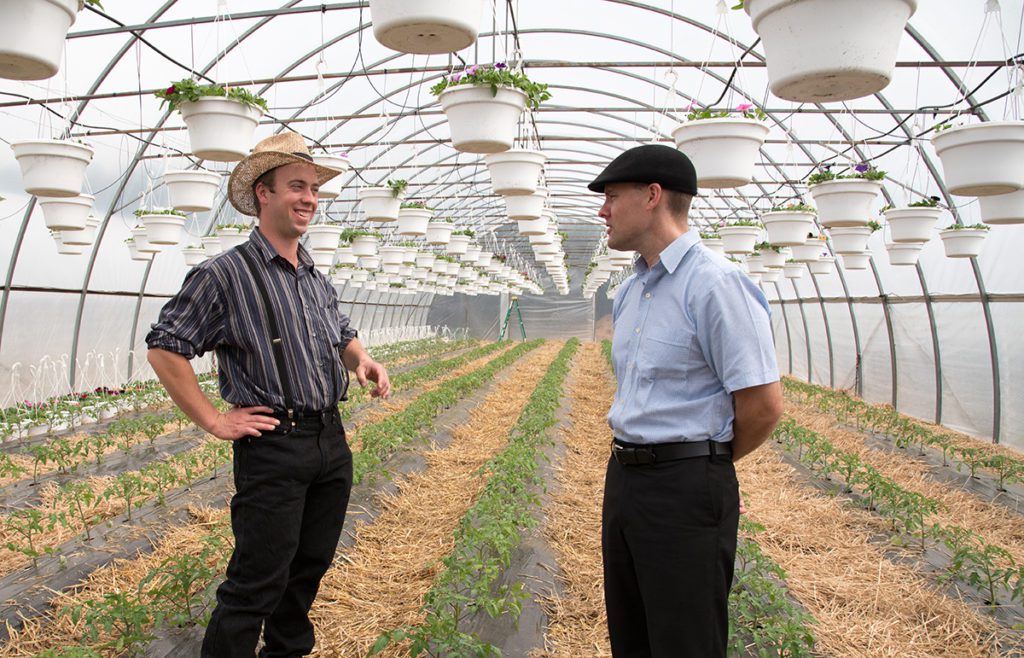May 10, 2016Relationships drive Cornell program
Commercial vegetable grower Nelson Hoover does not own a car, a computer or a degree. In fact, the 28-year-old never attended high school. But for over a decade, Hoover, a member of the Groffdale Mennonite Conference in Penn Yan, New York, has been one of the Cornell Vegetable Program’s (CVP) most trusted research partners.
A Cornell Cooperative Extension (CCE) regional agriculture team, CVP assists farmers in 12 western New York counties – the largest vegetable-producing region in the state – by helping them apply Cornell research and expertise to their local growing operations.
Two of those counties, Yates and Seneca, are home to the highest concentration of Old Order communities in the state. As their populations grows, the Amish and Mennonite influence on the area’s agriculture markets has followed suit. They now operate 99 percent of dairy farms in the area and own of one of the region’s largest produce auctions, which has grown by $185,000 annually over the last 12 years.
Working to maximize vegetable quality and output in Yates and Seneca counties is Cornell-trained horticulturalist and CVP extension vegetable specialist Judson Reid. Specializing in small-farm operations and high tunnel growing, Reid has become a trusted agricultural voice – even within those sects not typically receptive to outside influence.
“Jud is recognized as a resource through his programming and his work getting the state’s produce auctions going,” said Hoover, who estimates he and Reid have known each other for 16 years – back to when Hoover’s father, Howard, began sharing his first high tunnel designs with CCE educators. “Jud’s research and knowledge carry a lot of weight in this community and others. A lot of growers around here factor Jud’s insight into what type of varieties they plant and sell and how they use their high tunnel space.”
Though CVP’s science is respected across the state, Reid recognizes the success of his team’s work ultimately is seeded in the interpersonal relationships cultivated by its educators. “Without earning trust and buy-in from our constituents, CVP’s expertise would be wasted,” said Reid. “By no means do I work exclusively with Old Order farmers; it’s just that in this area they happen to own the majority of vegetable-growing operations. So it’s important I spend time learning their techniques and gauging their results. Our research is a two-way street.”
One of the keys to accessing that street has been Reid’s successful one-on-one work with growers like Hoover, with whom he conducts two to three research trials a year.
“Nelson’s farm is ideal for researching whether a technique can be implemented on a wider scale,” said Reid. “Because he is such a competent technician and fastidious record-keeper on what grows and sells well, I have real-life data that I can present to other farmers in the region as well as farmer groups throughout the state in the form of educational programming.”
The crux of Reid’s work with Hoover revolves around a trio of plastic-covered, climate-controlled high tunnels. Spanning 30 feet wide and stretching more than 100 feet long, the tunnels, along with his two greenhouses, lengthen Hoover’s growing season. They also provide fertile, intimate and controlled research grounds for CVP.
“What’s unique about Nelson’s operation is that he’s a successful wholesale grower operating on just 3.8 acres,” said Reid. “His niche is starting plants for other commercial growers, and the high tunnels help minimize his footprint and allow him to get the most bang for his buck through intense crop turnover. Because of that, he’s able to provide a nice incubator for trials in areas such as pest management, disease resistance and maximizing crop revenues in limited space.”
The success of those trials also has enhanced CVP’s credibility with the region’s Old Order farmers.
“By seeing the output that results from our relationship with Nelson, other Mennonite and Amish farmers are more apt to interact with our program to exchange ideas and information,” Reid says. “Forty out of the 41 high tunnels in Yates County are on Old Order farms, so those relationships are extremely important for furthering and sharing our research.”
Reid recognizes, however, that data points alone are not enough to earn trust from practitioners of Old Order faiths, and he’s spent years studying the customs and conventions of Amish and Mennonite cultures. Most of his breakthroughs, though, can be traced to a willingness to roll up his sleeves and get his hands dirty.
“Early in my career, I would spend entire days on Amish and Mennonite farms harvesting tomatoes right alongside the growers,” said Reid. “That led to getting invited in for a meal or to sit down for a cup of coffee on the porch and laid the groundwork for more involved interactions down the road.
“Over the years, I’ve been fortunate to develop friendships within those communities which has led to getting invited to events such as weddings, funerals and baptisms,” said Reid. “Accessing those social circles has further allowed me to understand the subtleties of how to move in those communities without offending people. In addition to being fulfilling on a personal level, those relationships have allowed me to be a more effective scientist and educator.”
– R.J. Anderson/Cornell Cooperative Extension

















